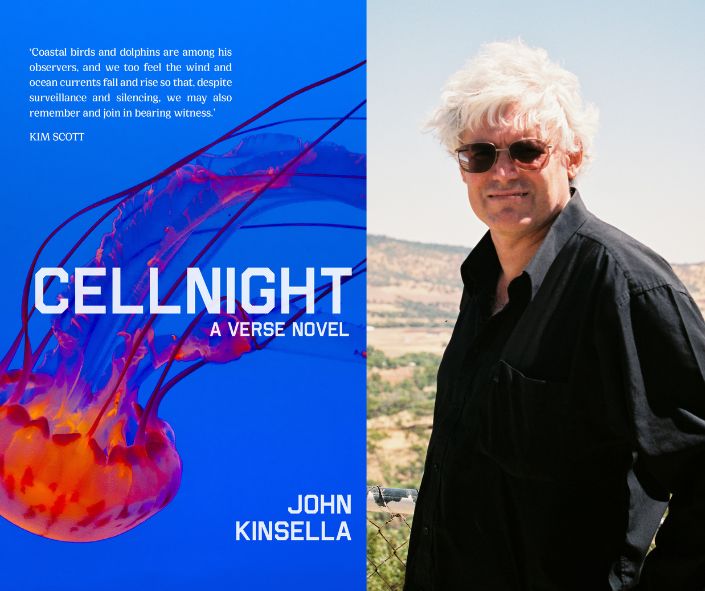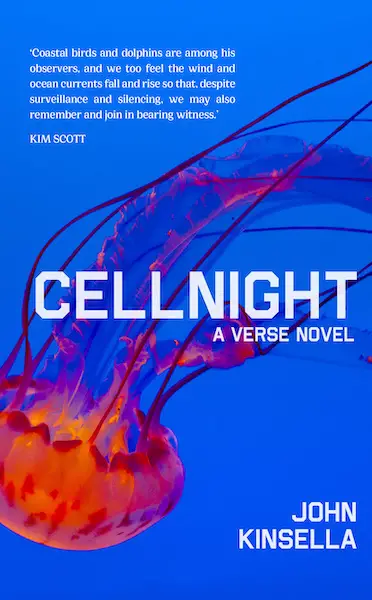Cellnight, a verse novel: John Kinsella on his inspiration
We welcome author John Kinsella to discuss the inspiration behind his latest literary work – Cellnight, a verse novel.

Disclosure: If you click a link in this post and make a purchase, I may earn a small commission.
John Kinsella on his inspiration for verse novel Cellnight
Cellnight is a work that I felt impelled to write. Based around the anti-nuclear protests against the American fleet in the 1980s in Fremantle/Walyalup, Western Australia, the story follows the experiences of a homeless protester dwelling around the port at that time. Ever since witnessing the brutal assault of an Indigenous youth in a lock-up by a group of policemen in the mid-80s, I made a vow that I would speak of what happened (despite officials directly and indirectly telling me to say nothing). This verse novel is an expression of that vow, and is part of a life-long campaign to hold colonial advantage and criminality to account. Being a fiction, it is not my life, but it certainly reflects my experience.
One of the key reasons I chose to write the story in verse is because I wanted the text to be full of iterations and echoes, to reverberate across past and present. The timeframe moves from the past to the present, and reflection over the events of the past informs the present. Past-present-past. Working through second person narration, the ‘you’ fluctuates between a strange kind of internal monologue/self-address (and self-scrutiny/excoriation) and as an address from an external narrator. All of this is woven into something that amounts to a dialogue between soul and body, and a meditation on place, especially with regard to the impacts of colonialism, materialism and militarism on the physical and spiritual environments of the region. It is an overtly environmentalist fiction.
The novel is full of the waters around the Port of Fremantle and the Cockburn Sound, and looks inland across ‘The Hills’ into the wheatbelt. The protagonist is both unattached and attached to the community around him — living in a shallow, limestone cave/hollow under the colonial gaol and place of infernal suffering, The Roundhouse, but alienated from the day to day happenings around him. Joining the anti-nuclear protests, he also protests the counter-protesting far right, and the military itself. This puts him somewhat out of kilter with some other protesters, who are focussed on the single ‘nuclear’ issue.
In planning this work, I wanted to ensure that the ‘intersectionality’ of rights, ecological and well-being issues were paramount — to suggest that all these concerns are interrelated. The story ebbs and flows around self-doubt, belief in the actions, and the responsibilities of witness. The protagonist is disturbed, distressed, struggling with a (his, too) heritage of colonial toxicity, and haunted by its iterations in his present. He looks back and sees ghost ships. He looks out and sees ghost ships in the now. They ‘trigger’ more memories.
I am interested in the relationship between the narrator and the protagonist. They are both intimately connected, and distanced. They fuse and then drive each other away like the same poles of a magnet. They are both implicated, but always trying to find a way through the contradictions of their ‘presence’. This is a book of confrontation with the ongoing assault of Indigenous peoples in custody. This is an acknowledgement that colonial murder is ongoing.
Being a verse novel, the form of the stanza-paragraphs is pivotal to the way the novel is read. I have utilised what my partner Tracy Ryan has referred to as my ‘spindle sonnets’ — measured more by syllables per line than words, and in fourteen-line stanza/paragraphs. And I hope these ‘spindles’ make the threads of the story flow and interweave, working with the land, water and air… with birds, fish and people, and always finding the military machines an incursion, and the nuclear a threat to all life. This is a work of preservation, conservation, peace, life and an attempt to contribute to the search for justice for those who have suffered and had their country/land and often their lives stolen from them. It is intended as a reminder that the past is now, and that the ships of colonialism still sail the seas.
Cellnight Synopsis

A unique experience. A novel in ‘spindle’ sonnets. A drama. An impassioned cry for a beautiful and stolen world under threat. A ‘protester’ who has been living in a shallow cave in the limestone cliff in front of Bathers Beach under the colonial Round House prison in Fremantle is arrested for demonstrating against the mid-80’s visit of the nuclear-armed 7th Fleet. In the cells the ‘protester’ witnesses police violence and threatens to tell what they have seen. An act of declaration becomes entangled with what is happening outside the cells. This haunting incantation looks back before and after these events, to the present day. The sea, the coast around Fremantle, the ‘Scarp’, all come into play in a work that attempts to decolonise the space, to contest nuclear, military and colonial power without claiming any rights over country.
‘In this verse-paced novel Kinsella never quite uses Auden’s phrase in The Fall of Rome – ‘altogether elsewhere’ – but we sense the priorities and judgement of the natural environment, and of an older world. Coastal birds and dolphins are among his observers, and we too feel the wind and ocean currents fall and rise so that, despite surveillance and silencing, we may also remember and join in bearing witness.’ – KIM SCOTT
‘A book against laughter and forgetting if ever there was one. Moving, incandescent, quietly devastating … Cellnight is contemplative, fiercely elegiac, and a panoramic ode to Whadjuk Noongar country and anti-ode to its settler colonial overlay. As Kendrick Lamar said: the judge make time. So does Kinsella.’ – DECLAN FRY
(Transit Lounge Publishing, April 2023)
Get your copy of Cellnight from:
Booktopia AU Amazon AU Transit LoungeMore thought-provoking literary fiction:
About the Author, John Kinsella
John Kinsella lives on Ballardong Noongar land at ‘Jam Tree Gully’ in the Western Australian wheatbelt, and went to high school on Yamaji land in Geraldton, and has also lived in USA, UK, Ireland and other zones. His recent publications include the poetry volumes The Weave with Thurston Moore (UWAP 2020) and The Ascension of Sheep, Collected Poems Volume One (1980-2005) (UWAP 2021). Previous story collections include the awards-listed Pushing Back (Transit Lounge 2021) and Old Growth (Transit Lounge, 2017). His memoir Displaced: A rural life was published by Transit Lounge in 2020.
